The global theranostic workflow platforms market is projected to grow from USD 256.9 million in 2025 to approximately USD 1,402.6 million by 2035, recording an absolute increase of USD 1,145.7 million over the forecast period. This translates into a total growth of 446.2%, with the market forecast to expand at a compound annual growth rate (CAGR) of 18.5% between 2025 and 2035.
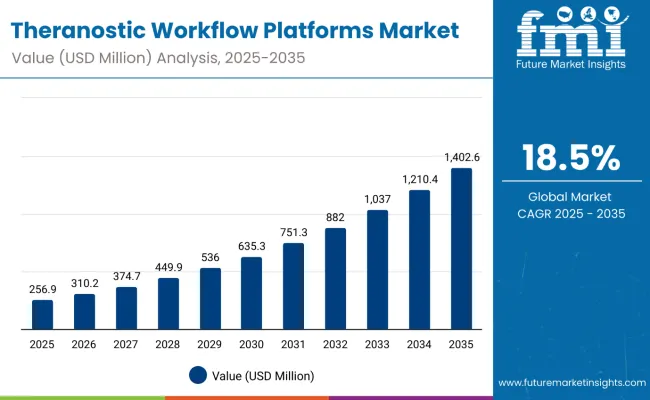
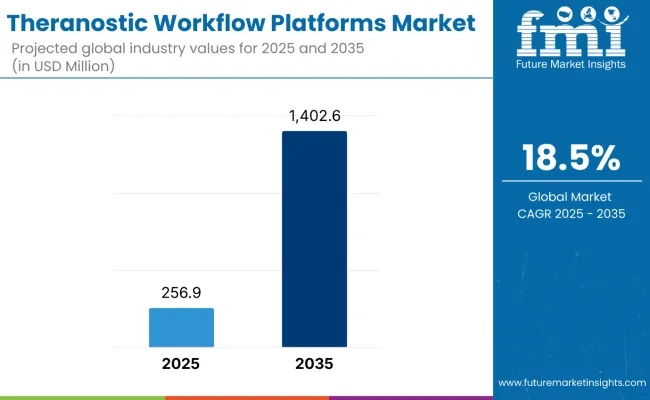
Theranostic Workflow Platforms Market Key Takeaways
| Metric | Value |
|---|---|
| Estimated Value in (2025E) | USD 256.9 million |
| Forecast Value in (2035F) | USD 1,402.6 million |
| Forecast CAGR (2025 to 2035) | 18.5% |
The overall market size is expected to grow by nearly 5.5X during the same period, supported by increasing adoption of precision medicine, rising demand for integrated diagnostic and therapeutic platforms, and growing focus on personalized healthcare solutions.
Between 2025 and 2030, the theranostic workflow platforms market is projected to expand from USD 256.9 million to USD 600.3 million, resulting in a value increase of USD 343.4 million, which represents 30.0% of the total forecast growth for the decade.
This phase of growth will be shaped by rising awareness about personalized medicine approaches, increasing demand for integrated diagnostic and therapeutic workflows, and growing penetration of theranostic platforms in emerging markets. Technology companies are expanding their theranostic workflow platform portfolios to address the growing demand for effective precision medicine solutions across various therapeutic areas.
From 2030 to 2035, the market is forecast to grow from USD 600.3 million to USD 1,402.6 million, adding another USD 802.3 million, which constitutes 70.0% of the overall ten-year expansion. This period is expected to be characterized by expansion of specialized healthcare facilities, integration of artificial intelligence and machine learning platforms with theranostic workflow management, and development of personalized treatment protocols.
The growing adoption of evidence-based medicine and healthcare provider recommendations will drive demand for clinically proven theranostic workflow platforms with enhanced efficacy and precision capabilities.
Between 2020 and 2025, the theranostic workflow platforms market experienced rapid expansion, driven by increasing recognition of precision medicine importance and growing acceptance of integrated diagnostic and therapeutic approaches.
The market developed as healthcare providers recognized the need for comprehensive workflow solutions to address complex treatment requirements across multiple therapeutic areas. Clinical research and regulatory approvals began emphasizing the importance of theranostic platforms in achieving better patient outcomes through personalized medicine approaches.
Market expansion is being supported by the increasing adoption of precision medicine and the corresponding demand for more effective integrated diagnostic and therapeutic approaches. Modern healthcare providers are increasingly focused on theranostic platforms that can streamline workflows, improve treatment precision, and reduce the complexity of multi-modal therapeutic approaches.
The proven efficacy of specific workflow platforms in treating complex conditions like cancer, cardiovascular diseases, and neurological disorders makes them essential components of comprehensive precision medicine treatment plans.
The growing emphasis on personalized medicine and precision healthcare is driving demand for tailored theranostic workflow solutions that address individual patient needs and molecular profiles. Healthcare provider preference for integrated platforms that combine diagnostic imaging, biomarker analysis, and treatment planning in single workflows is creating opportunities for innovative technology development.
The rising influence of clinical guidelines and evidence-based treatment protocols is also contributing to increased adoption of proven theranostic workflow platforms across different patient populations and therapeutic areas.
The market is segmented by modality, application type, workflow stage, end user, and region. By modality, the market is divided into molecular imaging-guided platforms, biomarker & companion diagnostic platforms, AI/ML-driven data integration platforms, radioisotope-based theranostics, omics-driven multi-modal platforms, and others.
Based on application type, the market is categorized into oncology, cardiology, neurology, infectious disease & immunology, rare & genetic disorders, and other applications. In terms of workflow stage, the market is segmented into biomarker discovery & validation, companion diagnostic development, clinical decision support systems, treatment monitoring & response, and post-treatment surveillance & adaptive therapy.
For end users, the market is divided into hospitals & specialty clinics, diagnostic laboratories, pharma & biopharma companies, academic & research institutes, and contract research organizations. Regionally, the market is divided into North America, Europe, East Asia, South Asia & Pacific, Latin America, and Middle East & Africa.
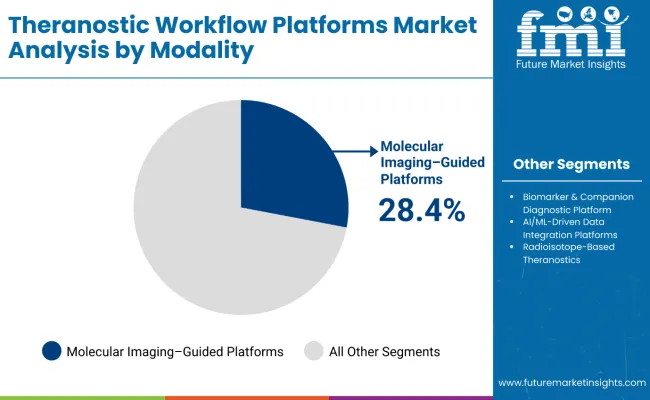
The molecular imaging-guided platforms segment is projected to account for 28.4% of the theranostic workflow platforms market in 2025, reaffirming its position as the category's dominant modality. Healthcare providers increasingly recognize the synergistic benefits of combining advanced imaging technologies with therapeutic planning for treating complex medical conditions, particularly in oncology and cardiovascular diseases. This modality addresses both diagnostic imaging requirements and treatment planning needs, providing comprehensive workflow coverage.
This modality forms the foundation of most precision medicine protocols, as it represents the most clinically validated and widely accepted integrated approach in theranostic workflows. Regulatory approvals and extensive clinical research continue to strengthen confidence in these platforms.
With increasing recognition of the importance of imaging-guided therapy requiring multi-targeted approaches, molecular imaging-guided platforms align with both acute treatment and long-term management goals. Their broad therapeutic utility across multiple indications ensures sustained market dominance, making them the central growth driver of theranostic workflow platform demand.
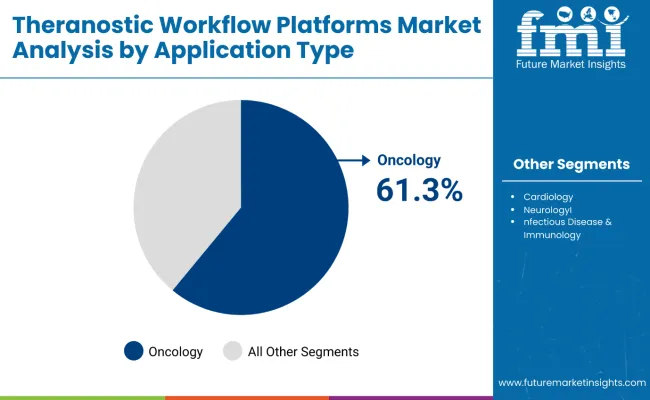
Oncology is projected to represent 61.3% of theranostic workflow platforms demand in 2025, underscoring its role as the primary application driving platform adoption. Healthcare providers recognize that cancer's complex pathophysiology, including tumor heterogeneity, treatment resistance, and metastatic potential, often requires integrated diagnostic and therapeutic approaches that conventional single-modality workflows cannot adequately address. Theranostic platforms offer enhanced precision in managing treatment-resistant cases and improving patient outcomes.
The segment is supported by the chronic nature of cancer requiring comprehensive therapeutic management and the growing recognition that integrated workflow approaches can improve treatment precision and patient quality of life.
Additionally, healthcare systems are increasingly adopting evidence-based treatment guidelines that recommend specific theranostic workflows for optimal outcomes. As clinical understanding of cancer's molecular complexity advances, integrated workflow platforms will continue to play a crucial role in comprehensive treatment strategies, reinforcing their essential position within the theranostic market.
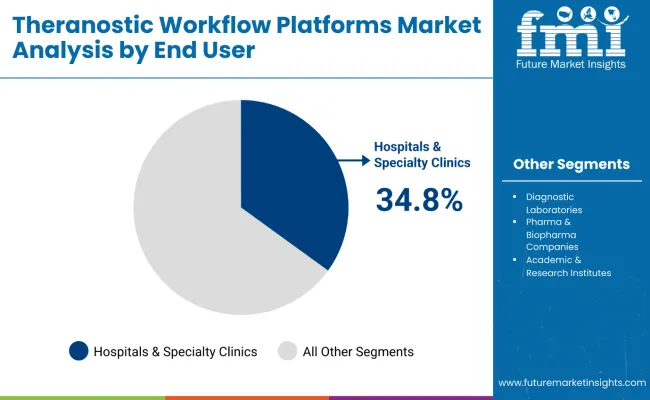
The hospitals & specialty clinics segment is forecasted to contribute 34.8% of the theranostic workflow platforms market in 2025, reflecting the primary role of healthcare institutions in precision medicine implementation and patient care. Healthcare facilities with comprehensive diagnostic and therapeutic capabilities rely on integrated workflow platforms for optimal patient management, making hospitals & specialty clinics the cornerstone of theranostic platform adoption. This segment provides essential services including advanced diagnostics, treatment planning, and comprehensive patient monitoring.
The segment benefits from established infrastructure and specialized healthcare teams who provide comprehensive precision medicine services and workflow coordination. Hospitals & specialty clinics also offer advantages in terms of advanced technology integration, multidisciplinary care coordination, and patient access through established healthcare networks. With growing emphasis on precision medicine and patient-centered healthcare services, hospitals & specialty clinics serve as critical implementation points for theranostic workflow platforms, making them fundamental drivers of market adoption and growth.
The theranostic workflow platforms market is advancing rapidly due to increasing recognition of precision medicine importance and growing demand for comprehensive integrated healthcare approaches. However, the market faces challenges including complex regulatory pathways, high implementation costs, and concerns about technology integration complexity. Innovation in workflow platform technologies and personalized treatment protocols continue to influence product development and market expansion patterns.
Expansion of Diagnostic Laboratories and Specialized Testing Facilities
The growing adoption of specialized precision medicine facilities is enabling more sophisticated theranostic workflow management and implementation. Diagnostic laboratories offer comprehensive testing services, including biomarker analysis and companion diagnostic testing, that are particularly important for complex integrated workflow platforms. Specialized testing facilities provide access to advanced diagnostic technologies that can optimize theranostic platform utilization and clinical decision-making.
Integration of AI/ML Technologies and Data Analytics Platforms
Modern technology companies are incorporating artificial intelligence and machine learning technologies such as predictive analytics, automated workflow optimization, and real-time treatment monitoring to enhance theranostic platform capabilities. These technologies improve workflow efficiency, enable personalized treatment recommendations, and provide better coordination between diagnostic and therapeutic processes. Advanced AI/ML platforms also enable precision medicine optimization and early identification of treatment response patterns or clinical outcomes.
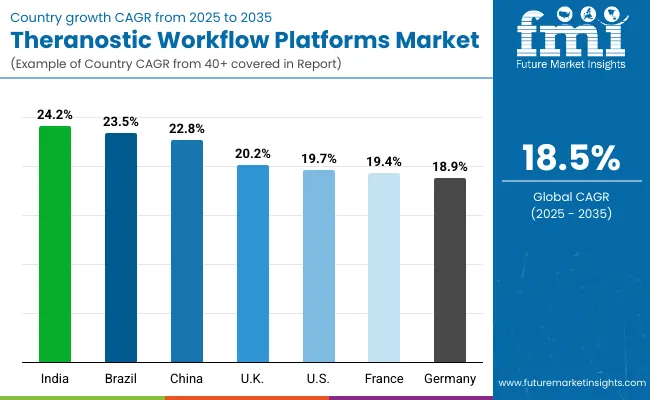
| Country | CAGR (2025 to 2035) |
|---|---|
| India | 24.2% |
| China | 22.8% |
| Brazil | 23.5% |
| USA | 19.7% |
| UK | 20.2% |
| Germany | 18.9% |
| France | 19.4% |
The theranostic workflow platforms market is experiencing varied growth globally, with India leading at a 24.2% CAGR through 2035, driven by expanding healthcare infrastructure, increasing precision medicine adoption, and growing access to advanced medical technologies. China follows at 22.8%, supported by healthcare system modernization, increasing recognition of precision medicine importance, and expanding technology integration capabilities. Brazil shows growth at 23.5%, emphasizing improved access to advanced healthcare technologies and integrated platform adoption.
The USA records 19.7% growth, focusing on innovation leadership and comprehensive precision medicine implementation. The UK shows 20.2% growth, representing advanced healthcare systems with established precision medicine frameworks.
The report covers an in-depth analysis of 40+ countries; seven top-performing countries are highlighted below.
Revenue from theranostic workflow platforms in China is projected to exhibit robust growth with a CAGR of 22.8% through 2035, driven by ongoing healthcare system modernization and increasing recognition of precision medicine as a priority healthcare approach.
The country's expanding healthcare technology infrastructure and growing availability of specialized precision medicine services are creating significant opportunities for integrated workflow platform adoption. Major international and domestic technology companies are establishing comprehensive implementation networks to serve the growing population of healthcare facilities requiring advanced theranostic workflow capabilities across urban and developing regions.
Revenue from theranostic workflow platforms in India is expanding at a CAGR of 24.2%, supported by increasing healthcare accessibility, growing precision medicine awareness, and expanding technology market presence. The country's large patient population and increasing recognition of integrated healthcare approaches are driving demand for effective theranostic workflow solutions. International technology companies and domestic manufacturers are establishing implementation channels to serve the growing demand for quality precision medicine platforms.
Demand for theranostic workflow platforms in the USA is projected to grow at a CAGR of 19.7%, supported by well-established precision medicine systems and evidence-based implementation guidelines. American healthcare providers consistently utilize integrated workflow platforms for complex medical conditions and precision treatment applications. The market is characterized by advanced technology protocols, comprehensive healthcare coverage, and established relationships between healthcare providers and technology companies.
Revenue from theranostic workflow platforms in Brazil is projected to grow at a CAGR of 23.5% through 2035, driven by healthcare system development, increasing access to precision medicine, and growing recognition of integrated healthcare importance. Brazilian healthcare providers are increasingly adopting theranostic workflow approaches for complex medical conditions, supported by expanding technology market presence and improved platform accessibility.
Revenue from theranostic workflow platforms in the UK is projected to grow at a CAGR of 20.2% through 2035, supported by the National Health Service framework and comprehensive evidence-based implementation guidelines that facilitate appropriate use of integrated workflow platforms for complex medical conditions. British healthcare providers consistently utilize established protocols for theranostic platform management, emphasizing patient outcomes and treatment optimization within integrated care systems.
Revenue from theranostic workflow platforms in Germany is projected to grow at a CAGR of 18.9% through 2035, supported by the country's well-established healthcare technology infrastructure, comprehensive healthcare coverage, and systematic approach to precision medicine implementation. German healthcare providers emphasize evidence-based workflow platform utilization within structured healthcare frameworks that prioritize clinical effectiveness and patient safety.
Revenue from theranostic workflow platforms in France is projected to grow at a CAGR of 19.4% through 2035, supported by the country's comprehensive healthcare system, established precision medicine infrastructure, and systematic approach to integrated healthcare implementation. French healthcare providers emphasize evidence-based workflow platform utilization within integrated care frameworks that prioritize patient outcomes and treatment continuity.
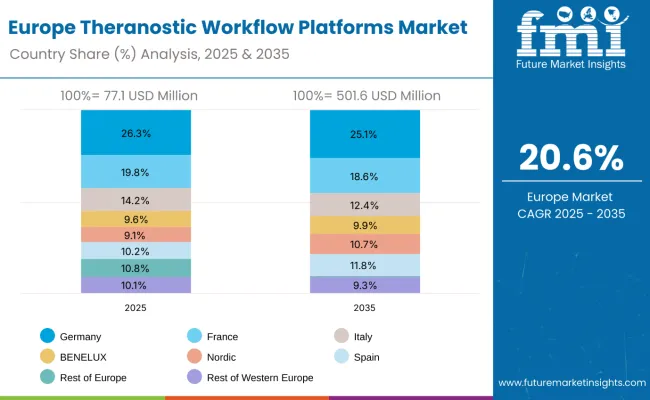
The theranostic workflow platforms market in Europe is projected to expand robustly through 2035, supported by increasing adoption of precision medicine approaches, rising prevalence of complex diseases requiring integrated treatment, and ongoing clinical innovation in multi-modal therapeutic platforms.
Germany will continue to lead the regional market, accounting for 26.3% in 2025 and declining slightly to 25.1% by 2035, supported by a strong clinical research base, advanced technology infrastructure, and robust precision medicine implementation capabilities. France follows with 19.8% in 2025, decreasing to 18.6% by 2035, driven by comprehensive healthcare system integration, advanced technology adoption, and expanding specialist networks.
Italy holds 14.2% in 2025, edging down to 12.4% by 2035 as other markets accelerate adoption of integrated workflow platforms and demand grows for specialized precision medicine solutions. The United Kingdom contributes 11.7% in 2025, remaining broadly stable at 11.9% by 2035, supported by strong NHS integration programs and growing clinical implementation participation. Spain represents 8.5% in 2025, inching upward to 8.7% by 2035, underpinned by strengthening access to precision medicine services and patient care programs.
BENELUX markets together account for 9.6% in 2025, moving to 9.9% by 2035, supported by innovation-friendly regulatory frameworks and academic-industry collaboration. The Nordic countries represent 9.1% in 2025, increasing to 10.7% by 2035, with demand fueled by progressive healthcare systems and early adoption of evidence-based precision medicine approaches. The Rest of Europe moderates from 10.8% in 2025 to 11.5% by 2035, as emerging markets within the region capture greater share of technology investment and adoption of integrated workflow platform protocols.
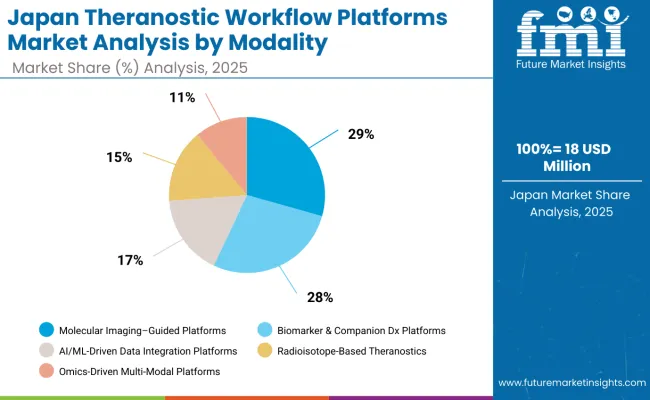
The theranostic workflow platforms market in Japan is set to remain diversified across several modality categories in 2025, reflecting clinical preferences in precision medicine practice and evolving implementation patterns. Molecular Imaging-Guided Platforms dominate with a 29.4% share in 2025, supported by their central role in managing complex diagnostic imaging requirements, treatment planning optimization, and comprehensive patient monitoring across multiple therapeutic areas.
Biomarker & Companion Diagnostic Platforms represent 27.6% in 2025, gaining traction from advanced diagnostic capabilities targeting personalized medicine approaches with integrated biomarker analysis benefits. AI/ML-Driven Data Integration Platforms hold 16.8%, sustained by their widespread use for workflow optimization and advanced analytics in precision medicine applications.
Meanwhile, Radioisotope-Based Theranostics account for 15.2%, driven by specialized nuclear medicine applications and targeted therapeutic approaches in oncology and other therapeutic areas. Omics-Driven Multi-Modal Platforms contribute 11.0%, largely to manage comprehensive genomic analysis and personalized treatment planning associated with precision medicine workflows. The remaining segments represent emerging technologies and novel platform-based combinations, reflecting the growing role of advanced precision medicine and experimental integrated approaches entering clinical practice.
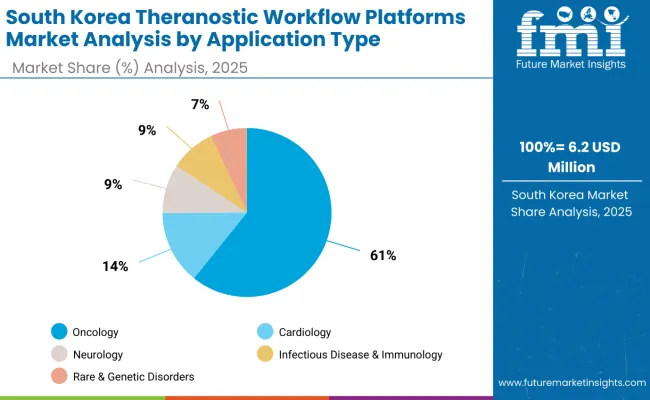
The theranostic workflow platforms market in South Korea in 2025 is shaped by strong demand across core application areas, reflecting both clinical prevalence and implementation guidelines. Oncology accounts for the largest share at 60.8%, supported by high rates of cancer diagnosis, advanced imaging technology adoption, and increasing integration of precision medicine approaches to address treatment complexity.
Cardiology follows with 14.1%, driven by the rising burden of cardiovascular diseases, heightened precision medicine awareness, and wider reimbursement for integrated diagnostic and therapeutic workflow protocols. Neurology contributes 9.4%, supported by the established use of advanced imaging and diagnostic platforms in conjunction with therapeutic planning to manage both acute and chronic neurological conditions.
Infectious Disease & Immunology holds 8.7%, reflecting growing utilization of integrated platforms in precision medicine approaches and specialized care applications. The remaining 7.0% is attributed to rare & genetic disorders, highlighting opportunities for specialized platforms and expanded clinical adoption in personalized medicine applications.
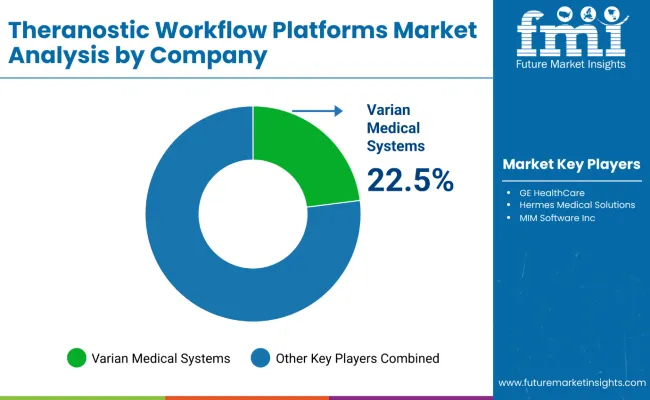
The theranostic workflow platforms market is characterized by competition among established medical technology companies, precision medicine focused firms, and specialized platform developers. Companies are investing in clinical research, regulatory compliance, strategic partnerships, and healthcare provider education to deliver effective, reliable, and accessible integrated workflow solutions. Platform development, clinical validation, and market access strategies are central to strengthening product portfolios and market presence.
Varian Medical Systems, USA-based, leads the market with 22.5% global value share, offering clinically-proven theranostic workflow platforms with a focus on precision and patient outcomes. GE HealthCare provides comprehensive imaging and diagnostic platform solutions with emphasis on integration capabilities and clinical effectiveness.
Hermes Medical Solutions focuses on innovative workflow technologies and specialized implementation systems for integrated theranostic platforms. MIM Software Inc. delivers established platform products with strong clinical evidence and healthcare provider acceptance.
These companies operate across key global markets with focus on bringing innovative workflow platform technologies to underserved healthcare facilities and patient populations. They provide comprehensive medical technology portfolios including integrated platforms across multiple therapeutic areas and clinical applications.
Companies specialize in customized implementation and technology management solutions for theranostic workflows, while others provide specialized platform alternatives and advanced integration capabilities to enhance market accessibility and healthcare provider access to essential integrated treatment technologies.
| Items | Values |
|---|---|
| Quantitative Units (2025) | USD 256.9 Million |
| Modality | Molecular Imaging-Guided Platforms, Biomarker & Companion Diagnostic Platforms, AI/ML-Driven Data Integration Platforms, Radioisotope-Based Theranostics , Omics-Driven Multi-Modal Platforms, Others |
| Application Type | Oncology, Cardiology, Neurology, Infectious Disease & Immunology, Rare & Genetic Disorders, Other Applications |
| Workflow Stage | Biomarker Discovery & Validation, Companion Diagnostic Development, Clinical Decision Support Systems, Treatment Monitoring & Response, Post-treatment Surveillance & Adaptive Therapy |
| End User | Hospitals & Specialty Clinics, Diagnostic Laboratories, Pharma & Biopharma Companies, Academic & Research Institutes, Contract Research Organizations |
| Regions Covered | North America, Europe, East Asia, South Asia & Pacific, Latin America, Middle East & Africa |
| Countries Covered | United States, Canada, United Kingdom, Germany, France, China, Japan, South Korea, India, Brazil, Australia and 40+ countries |
| Key Companies Profiled | Varian Medical Systems, GE HealthCare, Hermes Medical Solutions, MIM Software Inc. , Noul Co., Ltd., Morph X, Siemens Healthineers , Shenzhen Dymind Biotechnology Co., Ltd., Sysmex Corporation, Guardant Health |
| Additional Attributes | Dollar sales by modality type and therapeutic application, regional demand trends, competitive landscape, healthcare provider preferences for specific platforms, integration with specialty healthcare facilities, innovations in workflow optimization technologies, patient outcome monitoring, and clinical effectiveness optimization |
The global theranostic workflow platforms market is valued at USD 256.9 million in 2025.
The size for the theranostic workflow platforms market is projected to reach USD 1,402.6 million by 2035.
The theranostic workflow platforms market is expected to grow at a 18.5% CAGR between 2025 and 2035.
The key platform type segments in the theranostic workflow platforms market are molecular imaging-guided platforms, radiopharmaceutical development platforms, and integrated therapeutic platforms.
In terms of platform type, molecular imaging-guided platforms segment is set to command 28.4% share in the theranostic workflow platforms market in 2025.






Our Research Products

The "Full Research Suite" delivers actionable market intel, deep dives on markets or technologies, so clients act faster, cut risk, and unlock growth.

The Leaderboard benchmarks and ranks top vendors, classifying them as Established Leaders, Leading Challengers, or Disruptors & Challengers.

Locates where complements amplify value and substitutes erode it, forecasting net impact by horizon

We deliver granular, decision-grade intel: market sizing, 5-year forecasts, pricing, adoption, usage, revenue, and operational KPIs—plus competitor tracking, regulation, and value chains—across 60 countries broadly.

Spot the shifts before they hit your P&L. We track inflection points, adoption curves, pricing moves, and ecosystem plays to show where demand is heading, why it is changing, and what to do next across high-growth markets and disruptive tech

Real-time reads of user behavior. We track shifting priorities, perceptions of today’s and next-gen services, and provider experience, then pace how fast tech moves from trial to adoption, blending buyer, consumer, and channel inputs with social signals (#WhySwitch, #UX).

Partner with our analyst team to build a custom report designed around your business priorities. From analysing market trends to assessing competitors or crafting bespoke datasets, we tailor insights to your needs.
Supplier Intelligence
Discovery & Profiling
Capacity & Footprint
Performance & Risk
Compliance & Governance
Commercial Readiness
Who Supplies Whom
Scorecards & Shortlists
Playbooks & Docs
Category Intelligence
Definition & Scope
Demand & Use Cases
Cost Drivers
Market Structure
Supply Chain Map
Trade & Policy
Operating Norms
Deliverables
Buyer Intelligence
Account Basics
Spend & Scope
Procurement Model
Vendor Requirements
Terms & Policies
Entry Strategy
Pain Points & Triggers
Outputs
Pricing Analysis
Benchmarks
Trends
Should-Cost
Indexation
Landed Cost
Commercial Terms
Deliverables
Brand Analysis
Positioning & Value Prop
Share & Presence
Customer Evidence
Go-to-Market
Digital & Reputation
Compliance & Trust
KPIs & Gaps
Outputs
Full Research Suite comprises of:
Market outlook & trends analysis
Interviews & case studies
Strategic recommendations
Vendor profiles & capabilities analysis
5-year forecasts
8 regions and 60+ country-level data splits
Market segment data splits
12 months of continuous data updates
DELIVERED AS:
PDF EXCEL ONLINE
Theranostic NGS Market Size and Share Forecast Outlook 2025 to 2035
Workflow Management Software (WMS) Market Size and Share Forecast Outlook 2025 to 2035
Workflow-as-a-service Market – Growth & Adoption 2025 to 2035
Workflow Content Automation (WCA) Market Growth – Trends & Outlook 2023-2033
Sales Platforms Software Market Size and Share Forecast Outlook 2025 to 2035
Battery Platforms Market Analysis Size and Share Forecast Outlook 2025 to 2035
Clinical Workflow Solution Market Size and Share Forecast Outlook 2025 to 2035
Smart City Platforms Market Size and Share Forecast Outlook 2025 to 2035
Smart Home Platforms Market Growth – Trends & Forecast through 2034
IP Centrex Platforms Market
Aerial Work Platforms Market Size and Share Forecast Outlook 2025 to 2035
AI Security Platforms Market Size and Share Forecast Outlook 2025 to 2035
PET Imaging Workflow Market Analysis - Size, Share, and Forecast Outlook 2025 to 2035
Microlearning Platforms Market Size and Share Forecast Outlook 2025 to 2035
Virtual Event Platforms Market Trends - Growth & Forecast 2025 to 2035
Competitive Landscape of Virtual Event Platforms Market Share
Data Management Platforms Market Analysis and Forecast 2025 to 2035, By Type, End User, and Region
BRICS Aerial Work Platforms Market Size and Share Forecast Outlook 2025 to 2035
Digital Publishing Platforms Market Size and Share Forecast Outlook 2025 to 2035
Patient Engagement Platforms Market Size and Share Forecast Outlook 2025 to 2035

Thank you!
You will receive an email from our Business Development Manager. Please be sure to check your SPAM/JUNK folder too.
Chat With
MaRIA